These are 10 of the finest recordings of Bartók recordings listed in Gramophone.
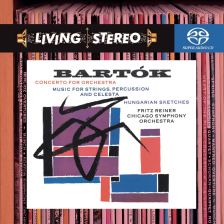
Concerto for Orchestra
Chicago Symphony Orchestra / Fritz Reiner
(RCA)
‘A classic recording by one of the master Bartók conductors. With staggering playing by the Chicago Symphony and recording that simply doesn’t sound its age, this is a magnificent achievement. RCA’s sound reportage of the Concerto for Orchestra has uncanny realism, and if the climaxes are occasionally reined in, the fervour of Reiner’s direction more than compensates…’
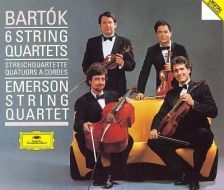
String Quartets
Emerson String Quartet
(DG)
‘The impression one gains from these recordings (I have not seen the Quartet in the concert hall) is of massive tonal projection and superlative clarity, each textural strand coloured and made audible to a degree possibly unrivalled in the recorded history of these works. DG’s close brightly-lit, yet never oppressive recording quality must share some of the credit for that, of course. Combine this with controlled vehemence, headlong velocity and razor-sharp unanimity (any fast movement from quartets two to five can serve as illustration) and you have a formidable alliance of virtues…’
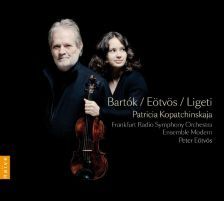
Violin Concerto No 2
Patricia Kopatchinskaja vnFrankfurt Radio Symphony Orchestra / Peter Eötvös
(Naive)
‘Bartók’s Second Violin Concerto has long since been accorded classic status and in – my guess – making a determined effort to ‘think it new’, Kopatchinskaja and Eötvös sometimes risk exaggerating what is already pretty intense. The effect can be downright hectic; but it’s a mightily exciting account, which certainly doesn’t rush its fences or sell the score short. When Bartók slackens the tension and allows lyric reflectiveness to emerge, as in the first movement’s development, this performance is poetic and subtly shaded to a fault; and even though the second and third movements are usually played with a somewhat lighter touch, I found the sheer intensity of Kopatchinskaja and Eötvös’s advocacy compelling…’
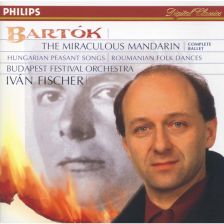
The Miraculous Mandarin
Budapest Festival Orchestra / Iván Fischer
(Philips)
‘As Mandarins go, they don’t come more miraculous than this – a vivid, no-holds-barred performance that henceforth tops my list of current recommendations. Everything tells – the flavour is right, the pacing too and the sound has a toughened, raw-edged quality that is an essential constituent of Bartók’s tonal language…Delicacy trails bullish aggression, forcefulness alternates with an almost graphic suggestiveness – and it’s all there in the full score. Fischer never vulgarizes, brutalizes or overstates the case and, what is most important, he underlines those quickly flickering, folkish elements in Bartók’s musical language (they are everywhere in evidence) that other, less intuitive conductors barely acknowledge…’
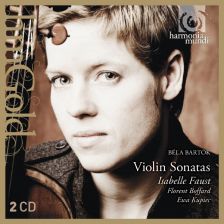
Violin Sonatas
Isabelle Faust vn Florent Boffard, Ewa Kupiec pfs
(Harmonia Mundi)
‘Here Faust approaches the music from a Bachian axis: her tone is pure, her double-stopping immaculate (and never abrasive) and her sense of timing acute. She obviously relishes the score’s balance of colour and counterpoint, and her performance is distinguished by a combination of musical intuition and technical finesse (a good place to sample is 5’49” into the first movement).I would strongly urge you to purchase this superb disc, even if you already own recordings of both works…’
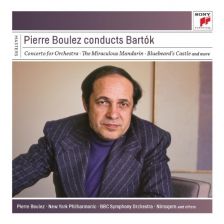
Bluebeard’s Castle
Nimsgern, Troyanos; BBC Symphony Orchestra / Pierre Boulez
(Sony)
‘Boulez’s pacing is ideally judged—in fact, throughout this memorable performance, he balances the constituent parts of Bartok’s rich tonal palette with a meticulous ear, patiently scaling the score’s many texturally complex climaxes. Nimsgern is a tortured, yet commanding Bluebeard, vocally excellent and interpretatively compelling, although the recording does sometimes lend his voice an untypically cavernous quality…’
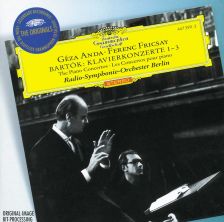
Piano Concertos
Géza Anda pf Berlin Radio Symphony Orchestra / Ferenc Fricsay
(DG)
‘Much as one would like to tout the new as the best, there are some older recordings where a very special chemistry spells ‘definitive’, and that pose an almost impossible challenge to subsequent rivals. Such is this 1959 recording of Bartók’s Second Piano Concerto, a tough, playful, pianistically aristocratic performance where dialogue is consistently keen and spontaneity is captured on the wing (even throughout numerous sessions). The first movement is relentless but never tires the ear; the second displays two very different levels of tension, one slow and mysterious, the other hectic but controlled; and although others might have thrown off the finale’s octaves with even greater abandon, Anda’s performance is the most successful in suggesting savage aggression barely held in check…’
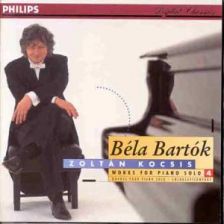
Piano Sonata
Zoltán Kocsis pf
(Philips)
‘Kocsis’s mastery of tone, rhythm and articulation, allied to his painstaking attention to important source material (namely Bartók’s scores and records), make for a level of pianistic distinction that is fairly unique in this repertory. To say that, with Kocsis, ‘less is more’ is to suggest executive reticence, which is certainly not the case…this is unquestionably one of the great piano records of the post-war period…’
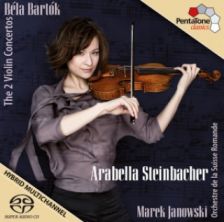
Violin Concertos
Arabella Steinbachervn Orchestre de la Suisse Romande / Marek Janowski
(Pentatone)
‘Arabella Steinbacher and Marek Janowski offer us Bartók in 3D, the three dimensions not only spatial but emotional as well. I can’t think of a version of the Second Concerto, past or present, where structure and content are more thoughtfully balanced, or where significant points in the score are more lovingly underlined. I lost count of the number of times I paused the CD player to note this or that salient detail…’
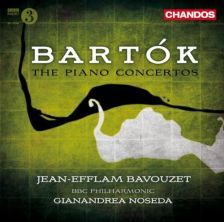
Piano Concertos
Jean-Efflam Bavouzet pf BBC Philharmonic Orchestra / Gianandrea Noseda
(Chandos)
‘If you’re after a disc of Bartók’s piano concertos that maximises on the music’s drive, elegance and sparring potential, then you could hardly do better than this ear-catching new production by Jean-Efflam Bavouzet and the BBC Philharmonic under the spirited direction of Gianandrea Noseda. Rarely have I encountered a reading of the First Concerto where, in the first movement especially, the sense of instrumental interplay is so consistently vital…’
Explore Bartók’s life and music…
Béla Bartók – the life and music of the Hungarian maverick
Béla Bartók’s music takes listeners on a journey through folklore and fantasy. Rob Cowan offers a guide to exploring his compelling genius…
Inside Bartók’s Solo Violin Sonata
Rob Cowan talks to violinist James Ehnes about the demands of Bartók’s Solo Violin Sonata…
Bartók’s piano concertos – the pianist’s sternest test
Tackling Bartók’s three piano concertos is tantamount to conquering Mount Everest – but is the view from the summit worth the climb, asks Geoffrey Norris…

Share it people